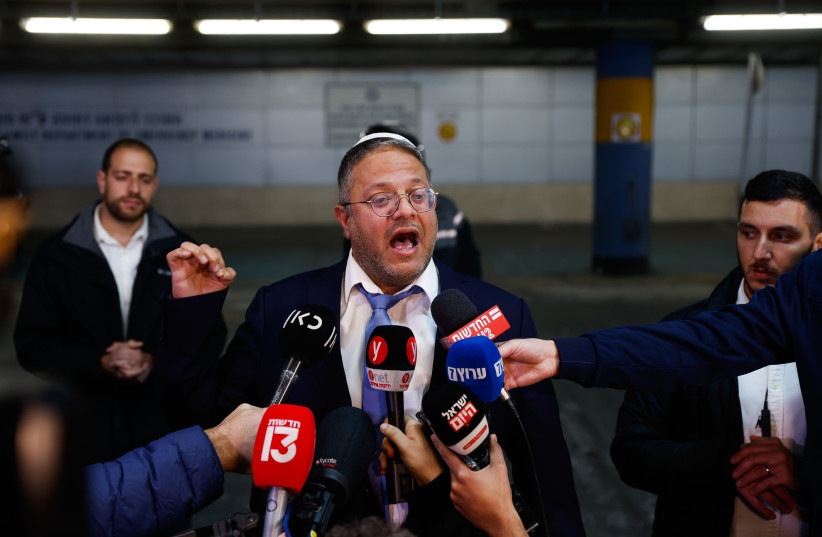A controversial bill that would give National Security Minister MK Itamar Ben-Gvir the power to order up to a year of administrative detention will reach the government's committee on legislation on Sunday.
The bill, sponsored by Otzma Yehudit MK Zvika Fogel, would grant Ben-Gvir powers that are similar to those given to the defense minister, whereby the minister, with the approval of the Attorney-General, her deputy, the State Attorney or his deputy, can order the arrest of someone if he is convinced that there is a "near certain possibility of real damage to public safety if that person is not detained."
The bill would also give the national security minister the power, under certain circumstances, to limit a person's exit from a specific place or area; prevent a person from leaving the country; to enter or be present in a specific place or region; to live or be present in a specific place or region; to report to the Israel Police over his or her intention to exit or enter a certain place; and more, including prohibiting someone from using the internet or limiting a person's work or profession.
According to the bill, the minister may not use these steps if there is a way to achieve the desired result with a lesser violation of the person's rights.
Bill necessary due to 'increased police activity of security nature,' lawmakers claim
According to the bill's explanatory section, the bill's necessity arose in the wake of "increased police activity of security nature," such as the police's responsibility for the Temple Mount, the riots during Operation Guardian of the Wall in May 2021, such that "the police's operation today does not just focus on public order but also on 'public safety.'"

The Public Defender's Office wrote in a legal opinion on Thursday that it strongly opposed the bill.
While there was no disputing the need to deal with the phenomena of serious crime, including in Arab society, the difficult events in Arab society require in-depth solutions, as opposed to 'magic solutions', the Public Defender's Office argued.
"This bill - similar to other initiatives being considered these days - constitutes a dramatic change in the fundamentals of criminal enforcement in Israel, and it even casts a deep and fundamental effect on the nature of the democratic regime," the office added.
"Administrative detention of a person presumed to be innocent - without sufficient evidentiary infrastructure, without reasonable suspicion of committing a criminal offense and relying only on intelligence about future and vague concerns, and in fact without a time limit - constitutes a fatal violation of the right to freedom and dignity.
"The mechanism proposed in the bill, under which in certain circumstances, arresting a person without being at all aware of the nature of the suspicions against him and without him and his lawyer being exposed to the evidence underlying the request for arrest - even seriously harms the fairness of the procedure and the citizen's ability to properly defend himself.
"The proposed administrative restrictions - which affect all lifestyles - result in the violation of many other fundamental rights such as freedom of movement, freedom of occupation and freedom of expression, and may also include people who are innocent of any crime," they added.
